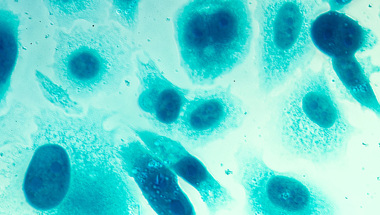
Developing a new approach to immunotherapy for prostate cancer

Grant information
Reference: RIA23-ST2-008
Lead researchers: Dr Emma Scott, Professor Craig Robson and Professor Derek Mann
Institution: Newcastle University
Award: £785,848
What you need to know
- The researchers are developing a potential treatment that could help the immune system fight prostate cancer.
- The treatment would target specific immune cells called myeloid cells, which usually protect the cancer, and turn them against the disease.
- The goal is to create new, effective treatments for advanced prostate cancer, potentially saving lives by combining these new drugs with existing hormone therapies.
Why are we funding this research?
Immunotherapy is a type of treatment that boosts the body’s immune system to recognise and kill cancer cells. Despite being very effective in some cancers, so far immunotherapies haven't worked well in prostate cancer.
This research explores a new way to harness the body's own immune system to kill prostate cancer. It focuses on myeloid cells, a type of immune cell that usually helps prostate cancer hide from the immune system. The researchers aim to find a way to turn these cells from cancer protectors into cancer fighters.
This approach has shown promise in other cancers and could lead to more effective treatments for prostate cancer.
What will the researchers do?
The researchers are focusing on a type of immune cell called myeloid cells. Normally, the immune system is meant to protect you from diseases like cancer, but in prostate cancer, these myeloid cells seem to help the disease hide from the immune system.
These cells have proteins called Siglecs on them that make them protect the cancer instead of fighting it off. The researchers want to block these Siglec proteins to turn the myeloid cells back into cancer fighters.
Firstly, they will collect tumour samples from men with prostate cancer. Some of these men will have cancers that respond to hormone therapies, while others will have cancers that don’t. The researchers will measure the levels of Siglec proteins in these samples and understand how they affect the body's ability to fight cancer.
The researchers will then test new drugs that block Siglec proteins on mice that have prostate cancer. These drugs have already shown promise in treating other types of cancer, like breast and lung cancer. They will see if these drugs can help the immune system kill prostate cancer cells in mice. They will also test if combining these drugs with hormone therapies works better than using them alone.
To make sure their findings are relevant to humans, the researchers will also compare the data from their mouse studies with data from men with prostate cancer who are already receiving immunotherapy. This comparison will help the team understand if the results seen in mice are likely to be the same in humans.
If the new drugs work well in mice, the researchers will gather all the necessary data to start clinical trials in humans. These trials will test if the drugs are safe and effective for men with prostate cancer.
I was previously supported by a Prostate Cancer UK Travelling Prize Fellowship. That invaluable support has allowed me to establish my own research group at Newcastle University, supported collaborations with leading researchers and also allowed us to generate important pre-clinical data on Siglecs in prostate cancer. We're thrilled that we can now build on these findings and focus on developing Siglec-targeting therapies. This award will allow us to better understand how Siglec receptors contribute to immunotherapy resistance and help us to identify which patients will benefit from Siglec-targeting therapies in the future.
How will this benefit men?
This research could lead to new treatments that boost the immune system's ability to fight the cancer. This approach could be especially beneficial for men with advanced prostate cancer, where current treatments often fail.
Additionally, combining these new drugs with existing hormone therapies could improve the way these treatments work for men, leading to more men surviving the disease and having a better quality of life.
Help us fund more research like this
Your donation helps us fund lifesaving research into better treatments for prostate cancer.





